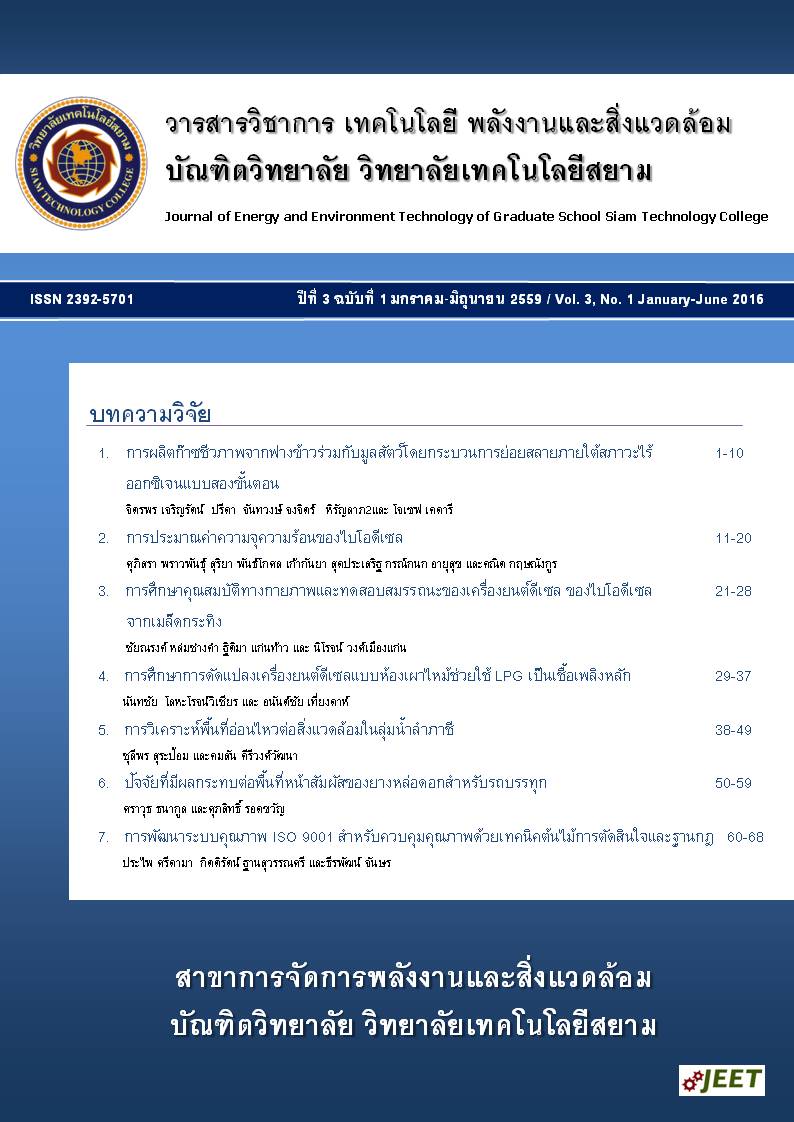Estimation Heat Capacity of Biodiesel
Main Article Content
Abstract
Biodiesel has widely been used as an alternative fuel in the high speed diesel engines. The heat capacity is one of the important physical properties of biodiesel. It directly affects the change in temperature of the fuel as heat is applied. This study is focused on developing a mathematical model for estimation of the heat capacity of fatty acid methyl ester (FAME) and biodiesel.
Heat capacity data were obtained from literature for modeling and validate the accuracy of the prediction. The results showed that the absolute deviation (AD%) were in the range of 0.07-2.24%. The average absolute deviation (ADD%) were 0.82 and 0.92%, respectively for FAME and biodiesel at 250-390 K. The AAD was better than the previously reported in literature. Moreover, the proposed model was much simpler. Only (average) carbon numbers and number of double bonds were required for the calculation.
Article Details
เนื้อหาและข่อมูลในบทความที่ลงตีพิมพ์ในวารสารวิชาการ เทคโนโลยี พลังงาน และสิ่งแวดล้อม บัณฑิตวิทยาลัย วิทยาลัยเทคโนโลยีสยาม ถือเป็นข้อคิดเห็นและความรับผิดชอบของผู้เขียนบทความโดยตรง ซึ่งกองบรรณาธิการวารสารไม่จำเป็นต้องเห็นด้วย หรือว่าร่วมรับผิดชอบใด ๆ
บทความ ข้อมูล เนื้อหา รูปภาพ ฯลฯ ที่ได้รับการตีพิมพ์ในวารสารวิชาการ เทคโนโลยี พลังงาน และสิ่งแวดล้อม บัณฑิตวิทยาลัย วิทยาลัยเทคโนโลยีสยาม ถือเป็นลิขสิทธิ์ของวารสารวิชาการ เทคโนโลยี พลังงาน และสิ่งแวดล้อม บัณฑิตวิทยาลัย วิทยาลัยเทคโนโลยีสยาม หากบุคคล หรือหน่วยงานใดต้องการนำทั้งหมด หรือส่วนหนึ่งส่วนใดไปเผยแพร่ต่อ หรือเพื่อกระทำการใด ๆ จะต้องได้รับอนุญาต เป็นลายลักษณ์อักษรจากวารสารวิชาการ เทคโนโลยี พลังงาน และสิ่งแวดล้อม บัณฑิตวิทยาลัย วิทยาลัยเทคโนโลยีสยาม เท่านั้น
References
Activities/KM/BioDiesel%20Manual.pdf, [12 มีนาคม 2558].
[2] โครงการเคยู-ไบโอดีเซล, 2550, ความรู้ทั่วไปเกี่ยวกับไบโอดีเซล [Online], Available:
http://www.biodiesel.rdi.ku.ac.th/index.php?option=com_content&task=view&id=7&Itemid=12,
[12 มีนาคม 2558].
[3] ลิพิด (lipid) [Online], Available: http://www.scimath.org/socialnetwork/groups/viewbulletin/288%E0%B8%A5%
E0%B8%B4%E0%B8%9E%E0%B8%B4%E0%B8%94+(lipid)?groupid=132, [21 สิงหาคม 2558].
[4] สุริยา พันธ์โกศล, 2556, การโยงสัมพันธ์สมบัติทางกายภาพของไบโอดีเซลกับพารามิเตอร์อุณหพลศาสตร์,
วิทยานิพนธ์ปริญญาปรัชญาดุษฎีบัณฑิต สาขาเทคโนโลยีพลังงาน คณะพลังงานสิ่งแวดล้อมและวัสดุ, มหาวิทยาลัย
เทคโนโลยีพระจอมเกล้าธนบุรี, หน้า 45.
[5] Pauly, J., Kouakou, A.C., Habrioux, M., Mapihan, K., 2014, “Heat capacity measurements of pure fatty acid
methyl esters and biodiesels from 250 to 390 K”, Fuel, Vol. 137, pp. 21-27.
[6] Dzida, M., Prusakiewicz, P., 2008, “The effect of temperature and pressure on the physicochemical properties of petroleum diesel oil and biodiesel fuel”, Fuel, Vol, 87, pp. 1941-1948.
[7] Phankosol, S., & Krisnangkura., 2014, “Estimation kinematic viscosity of biodiesel produced by ethanolysis. in 6thInternation Science, SocialSciences” Engineering and Energy Conference, Prajaktra Design Hotel, UdonThani, Thailand.
[8] Valderrama, J.O., Toro, A., Rojas, R.E., 2011, “Prediction of the heat capacity of ionic liquids using the mass connectivity index and a group contribution method”, The Journal of Chemical Thermodynamics, Vol. 43, pp. 1068-1073.
[9] Ceriani, R., Gani, Rafiqul., Meirelles, A, J.A., 2009, “Prediction of heat capacity and heats of vaporization of organic liquids by group contribution method”, Fluid Phase Equilibria, Vol. 283, pp. 49-55.
[10] ศูนย์เครือข่ายข้อมูลอาหารครบวงจร, ดิฟเฟอเรยเชียลสแกนนิงแคลอริมิเตอร์, [Online], Available:
http://www.foodnetworksolution.com/wiki/word/2606/differential-scanning-calorimeter [3 มีนาคม 2559].


